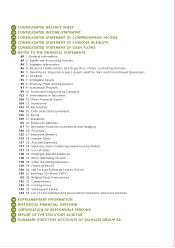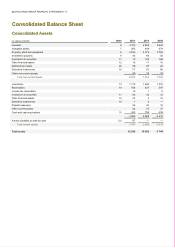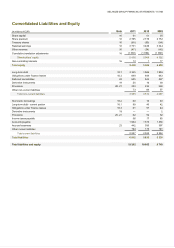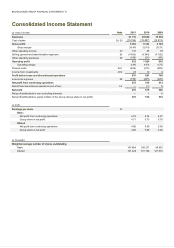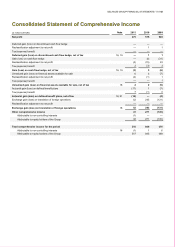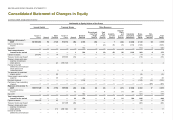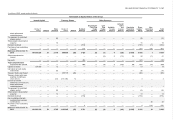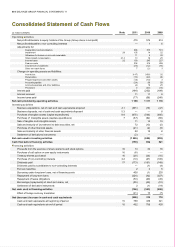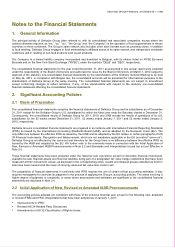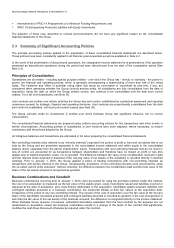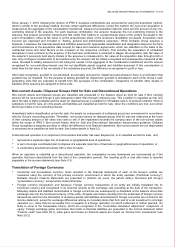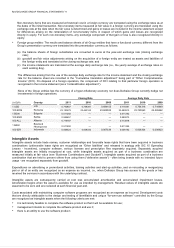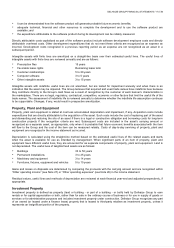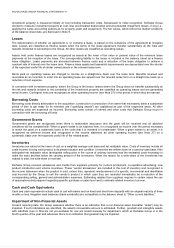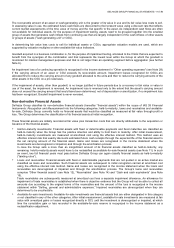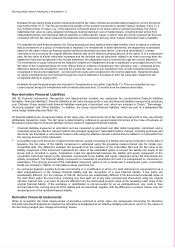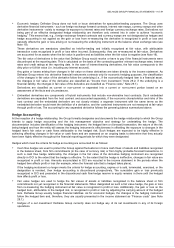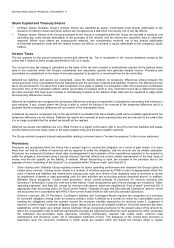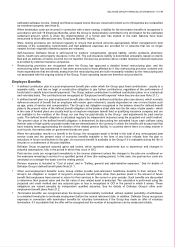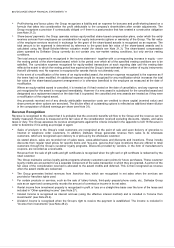Food Lion 2011 Annual Report Download - page 72
Download and view the complete annual report
Please find page 72 of the 2011 Food Lion annual report below. You can navigate through the pages in the report by either clicking on the pages listed below, or by using the keyword search tool below to find specific information within the annual report.
70 // DELHAIZE GROUP FINANCIAL STATEMENTS ’11
• Amendments to IFRIC 14 Prepayments of a Minimum Funding Requirement; and
• IFRIC 19 Extinguishing Financial Liabilities with Equity Instruments.
The adoption of these new, amended or revised pronouncements did not have any significant impact on the consolidated
financial statements of the Group.
2.3 Summary of Significant Accounting Policies
The principle accounting policies applied in the preparation of these consolidated financial statements are described below.
These policies have been consistently applied to all financial years presented except as explained in Note 2.2.
In the event of the presentation of discontinued operations, the comparative income statement is re-presented as if the operation
presented as discontinued operations during the period had been discontinued from the start of the comparative period (See
Note 5.3).
Principles of Consolidation
Subsidiaries are all entities - including special purpose entities - over which the Group has - directly or indirectly - the power to
govern the financial and operating policies, which is generally accompanying a shareholding of more than half of the voting
rights. The existence and effect of potential voting rights that would be exercisable or convertible at year-end, if any, are
considered when assessing whether the Group controls another entity. All subsidiaries are fully consolidated from the date of
acquisition, being the date on which the Group obtains control, and continue to be consolidated until the date such control
ceases. For a list of all subsidiaries, see Note 36.
Joint ventures are entities over whose activities the Group has joint control, established by contractual agreement and requiring
unanimous consent for strategic, financial and operating decisions. Joint ventures are proportionally consolidated from the date
joint control is established, until such joint control ceases (see Note 36).
The Group currently holds no investments in entities over which Delhaize Group has significant influence, but no control
("associates").
The consolidated financial statements are prepared using uniform accounting policies for like transactions and other events in
similar circumstances. Accounting policies of subsidiaries or joint ventures have been adjusted, where necessary, to ensure
consistency with the policies adopted by the Group.
All intragroup balances and transactions are eliminated in full when preparing the consolidated financial statements.
Non-controlling interests (also referred to as “minority interests”) represent the portion of profit or loss and net assets that is not
held by the Group and are presented separately in the consolidated income statement and within equity in the consolidated
balance sheet, separately from the parent shareholders’ equity. Transactions with non-controlling interests that do not result in
loss of control are accounted for as transactions between shareholders and therefore have no impact on profit or loss (this
applies also to related acquisition costs), nor on goodwill. The difference between fair value of any consideration received or paid
and the relevant share acquired or disposed of the carrying value of net assets of the subsidiary is recorded directly in retained
earnings. Prior to January 1, 2010, the Group applied a policy of treating transactions with non-controlling interests as
transactions with parties external to the Group. Consequently, acquisition of non-controlling interests were accounted for using
the so-called “parent entity extension” method, whereby, the difference between the consideration paid and the book value of the
share of the net assets acquired is recognized as goodwill.
Business Combinations and Goodwill
Business combinations occurring prior to January 1, 2010, were accounted for using the purchase method. Under this method,
the cost of an acquisition is measured as the fair value of the assets given, equity instruments issued and liabilities incurred or
assumed at the date of acquisition, plus costs directly attributable to the acquisition. Identifiable assets acquired, liabilities and
contingent liabilities assumed in a business combination are measured initially at their fair values at the acquisition date,
irrespective of the extent of any non-controlling interest. The excess of the cost of acquisition over the fair value of the Group’s
share of the identifiable net assets acquired and contingent liabilities assumed is recorded as goodwill. If the cost of acquisition is
less than the fair value of the net assets of the business acquired, the difference is recognized directly in the income statement.
When Delhaize Group acquires a business, embedded derivatives separated from the host contract by the acquiree are not
reassessed on acquisition unless the business combination results in a change in the terms of the contract that significantly
modifies the cash flows that would otherwise be required under the contract.



